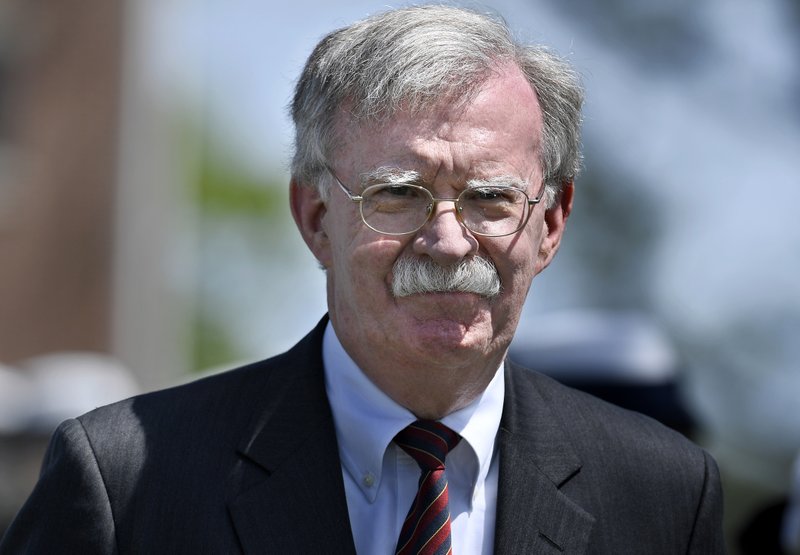ABU DHABI, United Arab Emirates -- President Donald Trump's national security adviser warned Iran on Wednesday that any attacks in the Persian Gulf will draw a "very strong response" from the U.S., taking a hard-line approach with Tehran after his boss two days earlier said America wasn't "looking to hurt Iran at all."
John Bolton's comments are the latest amid heightened tensions between Washington and Tehran that have been playing out in the Middle East.
Bolton spoke to journalists in Abu Dhabi, the capital of the United Arab Emirates, where only days earlier former Defense Secretary James Mattis warned that "unilateralism will not work" in confronting the Islamic Republic.
The dueling approaches highlight the divide over Iran within American politics. The U.S. has accused Tehran of being behind a string of incidents this month, including the alleged sabotage of oil tankers off the Emirati coast, a rocket strike near the U.S. Embassy in Baghdad and a coordinated drone attack on Saudi Arabia by Yemen's Iran-allied Houthi rebels.
On Wednesday, Bolton told journalists that there had been a previously unknown attempt to attack the Saudi oil port of Yanbu as well, which he blamed on Iran. He described Tehran's decision to back away from its 2015 atomic deal with world powers as evidence it sought nuclear weapons, even though it came a year after America unilaterally withdrew from the agreement.
Bolton stressed the U.S. had not seen any further Iranian attacks, something he attributed to the recent military deployments -- America recently sent an aircraft carrier and B-52 bombers to the Persian Gulf. But he warned the U.S. would strike back if attacked.
"The point is to make it very clear to Iran and its surrogates that these kinds of action risk a very strong response from the United States," Bolton said, without elaborating.
Bolton spoke before talks with Abu Dhabi's crown prince, Sheikh Mohammed bin Zayed Al Nahyan. He declined to have his remarks recorded.
Iranian Foreign Minister Mohammad Javad Zarif has repeatedly criticized Bolton as a warmonger. Abbas Mousavi, a spokesman for Iran's Foreign Ministry, said later Wednesday that Bolton's remarks were a "ridiculous accusation."
Separately in Tehran, President Hassan Rouhani said that the "road is not closed" when it comes to talks with the U.S. -- if America returns to the nuclear deal. However, the relatively moderate Rouhani faces increasing criticism from hard-liners and Supreme Leader Ayatollah Ali Khamenei over the collapsing accord.
Meanwhile, acting U.S. Defense Secretary Patrick Shanahan said some 900 troops going to the Middle East over the perceived Iran threat to reinforce the tens of thousands already in the region would be placed in Saudi Arabia and Qatar. Another 600 attached to a Patriot missile battery have had their deployment in the region extended.
"The Iranian threat to our forces in the region remains," Shanahan said.
Earlier this month, on the first anniversary of Trump's withdrawal from the nuclear deal, Tehran announced that it would begin to back away from the agreement.
The accord saw Iran limit its enrichment of uranium in exchange for the lifting of economic sanctions. Trump pulled out of the accord as he said it didn't go far enough in limiting the Iranian nuclear program, nor did it address Iran's ballistic missile program.
Bolton said that without more nuclear power plants, it made no sense for Iran to stockpile more low-enriched uranium as it now plans to do. The U.S. also has cut off Iran's ability to sell its uranium to Russia in exchange for unprocessed yellow-cake uranium.
Iran has set a July 7 deadline for Europe to offer better terms to the unraveling nuclear deal. Otherwise, Iran said, it will resume enrichment closer to weapons level. Bolton declined to say what the U.S. would do in response to that.
Bolton's trip to the UAE came days after Trump in Tokyo appeared to welcome negotiations with Iran.
"We're not looking for regime change -- I just want to make that clear," Trump said.
Information for this article was contributed by Nasser Karimi and Amir Vahdat of The Associated Press.
A Section on 05/30/2019
